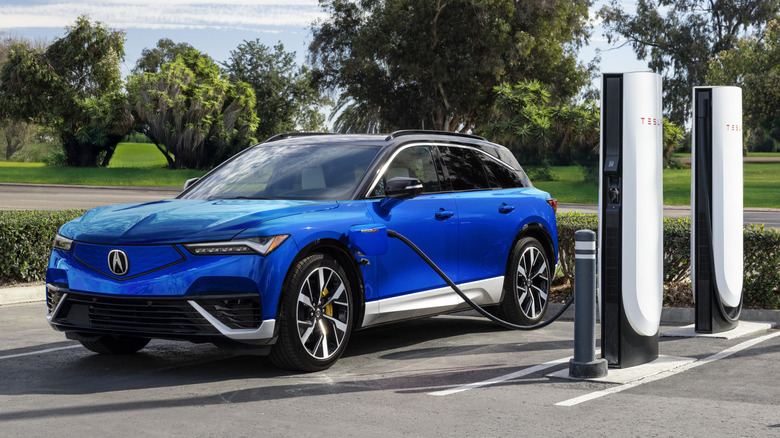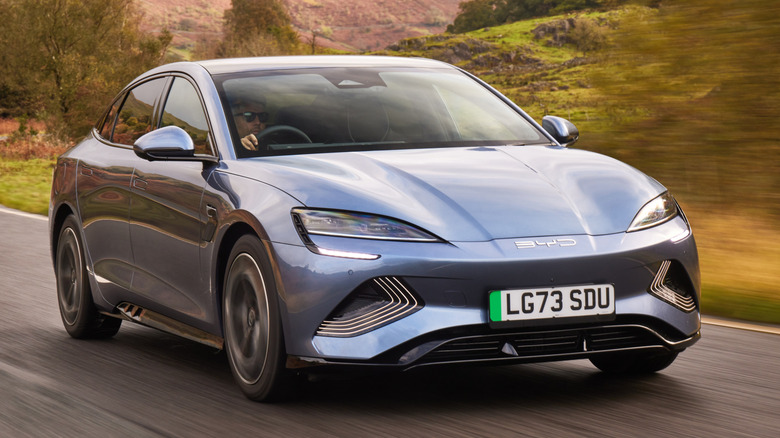These Canceled Cars Prove That Automakers Are Backtracking On EVs
The automotive industry is in the midst of one of the biggest shifts in living memory, as buyers and carmakers across the world switch to electrified cars. It has proved extremely difficult for anyone to predict exactly when consumers will start buying EVs en masse, and some of the world's largest carmakers are now realizing that they might have been too optimistic about EV adoption.
Recent months have seen a wave of cancellations, both of upcoming and existing EV models. Porsche announced in September that its upcoming SUV model will now be available with a hybrid and an ICE powertrain, having previously been planned as an all-electric car. A week prior, Stellantis had also announced that it was cancelling the development of its Ram 1500 EV pickup, blaming the slowing demand for electric trucks. Dodge's electric Charger took the unfortunate title of being one of the slowest-selling cars of 2024, and in September 2025, a report by Mopar Insiders claimed that a planned high-performance version of the car had been canned.
It isn't just upcoming models that have been cancelled. Honda abruptly ended production of the GM-built Acura ZDX in September, while Nissan has temporarily discontinued production of the Ariya SUV. These cancellations all happening around the same time are no mere coincidence — in fact, there's a good reason why automakers expect EV demand to drop over the coming months.
Why is EV demand slowing in America?
The current U.S. government administration's controversial and ever-changing tariff system has heaped additional costs and uncertainty on automakers that were already struggling with a rapidly evolving market. The latest data indicates that these tariff-related costs are being passed on to car buyers, with KBB reporting that the average new car buyer paid $50,080 in September, the highest average figure ever recorded. EVs already had a price problem, and the tariffs have made them even less affordable for many Americans.
Another factor set to dampen demand for EVs is the end of federal tax credits, which were discontinued on September 30th, 2025. The removal of the incentive makes EVs even less appealing from a value perspective, with Ford CEO Jim Farley predicting that it might be enough to shrink EV market share down from 10% to as little as 5% in the coming years.
Concerns also remain over the practicality of relying on America's charging network. A 2024 report by the Harvard Institute for Business in Global Society claimed that public chargers had an average reliability rate of 78 percent, and that pricing continued to vary dramatically between networks. The report compared the current state of public charging in America to the "Wild West," and noted that the current network was not equipped to handle a rise in the number of EVs on the road.
Chinese brands are rising in popularity in other markets
While EV adoption remains relatively low in America, other global car markets have significantly higher numbers of EV buyers. However, legacy carmakers are facing problems in these other markets too, primarily from the influx of Chinese-made cars. According to ACEA data, Chinese cars made up 35.4% of all global sales in 2024, making the country the world's largest automotive producer. Consumers in China have also played a big role in increasing global EV sales, but government policies aimed at boosting domestic manufacturing have led to oversupply in its local car market.
As a result, Chinese carmakers have dropped their prices in a bid to sell their excess inventory, leading to far lower demand in China for cars from American and European manufacturers. In Europe, Chinese car brands have also begun to get a foothold in key markets like the U.K., selling cheap EVs that have helped speed up the switch to electrification. U.K. sales data from September 2025 shows that over half of the new cars in the country were hybrid, PHEV, or all-electric, but three out of ten of the top-selling car models hailed from Chinese brands.
With sales in global EV markets being slowed by upstart Chinese competitors and U.S. EV sales expected to drop over the coming months, big global carmakers will have to continue to make tough decisions about their lineups. It's likely that we'll see more EVs discontinued in the near future as automakers continue to adjust their output to the new realities of the market.


